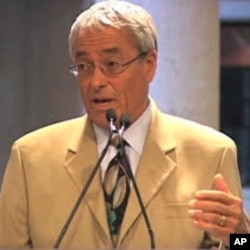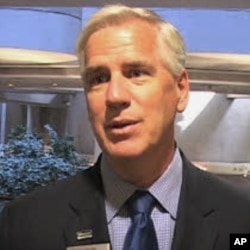Many hotels around the United States are going green by recycling their waste and conserving water, power and other resources. The largest hotel in Los Angeles, the Westin Bonaventure, was recently certified as green by the environmental group Green Seal. Hotel managers say the change will help the environment, and is also good for business.
The Bonaventure is a 37-story tower with more than 1,300 guest rooms in the heart of Los Angeles.
LA officials, including Mayor Antonia Villaraigosa recently announced that the hotel has qualified for certification by Green Seal, a non-profit group that promotes sustainable practices.
"President Obama calling on all of us to reinvent commerce in America and create Green Collar jobs," he said. "Let's embrace this challenge."
It is the first hotel in the city to get the organization's stamp of approval.
Green Seal's Gary Petersen says the organization works with the hotel in every area of its operations.
"We come in and survey and take a look at the hotel, all the different things from room service to towels to the paper they use, the recycling, the food waste, you name it," he said. "And then what we do is we consolidate that into recommendations, and then follow through to make those changes."
Trash is recycled. Laundry is cleaned with biodegradable detergent.
Kitchen waste is composted to make fertilizer. Hotel workers have switched to non-toxic cleaners. Low-energy lights reduce power use.
Michael Czarcinski, the hotel's managing director, says some of his staff suggested the changes. He says the new green certification will be used to market the hotel to environmentally conscious customers.
"From a marketing standpoint, yes, that's a great story, but the bottom line is, we're being great to our local economy, to the environment, and really reducing the use of toxic chemicals, paper products, and making sure that we're composting all of our food waste," he explained.
It cost $20,000 to change hotel practices and educate the staff. Recycling and other so-called green practices are expected to produce more than $200,000 a year in savings while reducing the hotel's impact on the environment.






